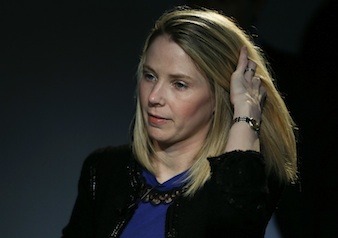Yahoo CEO Marissa Mayer is reportedly tossing conventional business thought aside and calling in telecommuters.

Yahoo CEO Marissa Mayer wants employees to work in the office, instead of at home. (Reuters file photo)
Mayer, who became CEO last year, has been working to turn around the struggling company. Now she wants to get employees working more efficiently and creatively by forcing them to work in the office instead of at home.
According to published memos, Mayer told telecommuting employees that starting in June, their days of working at home are over.
"To become the absolute best place to work, communication and collaboration will be important, so we need to be working side-by-side," Mayer wrote in a memo obtained by All Things D. "That is why it is critical that we are all present in our offices. Some of the best decisions and insights come from hallway and cafeteria discussions, meeting new people, and impromptu team meetings. Speed and quality are often sacrificed when we work from home. We need to be one Yahoo, and that starts with physically being together."
Yahoo declined to comment on the report.
The call to end telecommuting was a surprising move since many companies are increasingly allowing employees to work from home offices, saving workers time spent in their cars and saving the company from the cost of hosting workers on premise.
Telecommuting also is seen as a work/life balance perk for employees who are increasingly asked to work evenings and weekends.
"I think some companies do think about it, but the best companies want to create as wide a pool of potential employees as possible," said Zeus Kerravala, an analyst with ZK Research. "I think it could limit their ability to hire new people who aren't local to Yahoo, and it could cause Yahoo to lose some existing talent from people who do telecommute."
Workers coping with the slowly recovering economy may find it's not easy to walk out of one job and quickly find another. A long daily commute on Silicon Valley's crowded highways may not push out as many telecommuters as it would have when the economy was booming.
While some workers may be unhappy about the shift in their daily work lives, the change could help Yahoo, said Dan Olds, an analyst with The Gabriel Consulting Group.
"I think this may actually help company morale and camaraderie in the long run," Olds said. "Initially, home workers are going to hate making the slog into the office every day. But over time, I think they'll find that contact with co-workers spurs their creativity and productivity."
Both Olds and Kerravala said while all eyes may be on Mayer and what she's doing at Yahoo, that doesn't mean other companies will automatically jump to toss out their telecommuting policies.
"While most can probably see the benefits of significantly reducing work at home, I think they'll balk when they start totaling up the additional costs for real estate and paper clips," said Olds. "Mayer has been continually thinking outside the box while at Yahoo, and this move is just the latest example, but probably not the last example."
Yahoo CEO Marissa Mayer thinks workers are more efficient and creative when they're in the office. Is ending employee telecommuting a smart idea or not?





